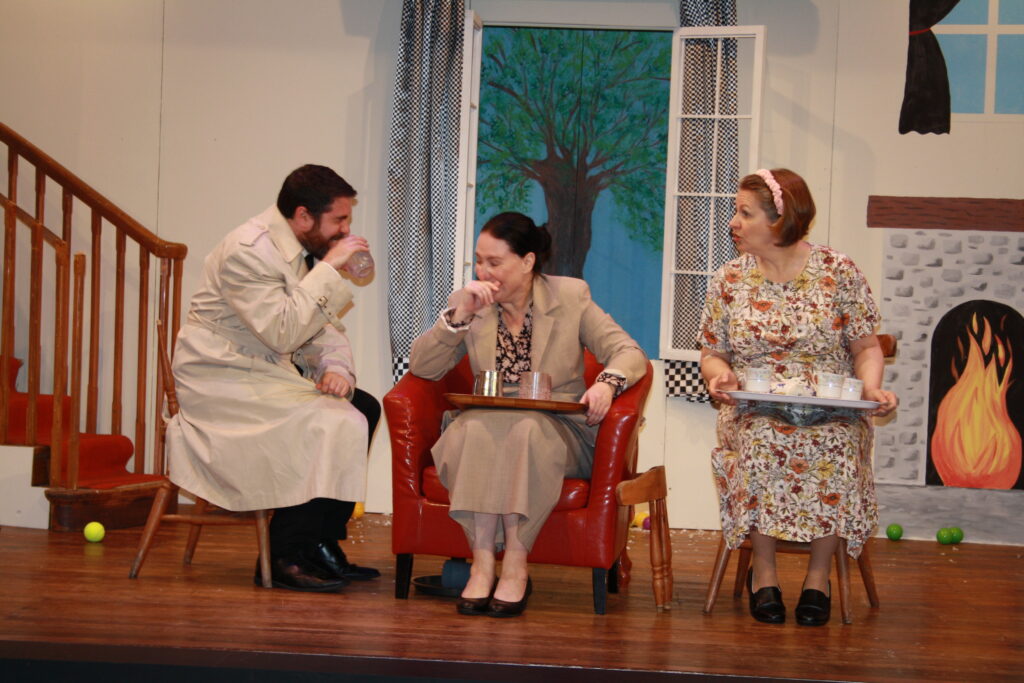
‘Murder at Checkmate Manor’ // St Luke’s Theatre Society
‘Murder at Checkmate Manor’ was charming.
Before there was Mischief Theatre and ‘The Play That Goes Wrong,’ there was a series of plays concerning the fictitious Farndale Avenue Housing Estate Townswomen’s Guild Dramatic Society. These plays by David McGillivray and Walter Zerlin Jr. pioneered the idea of a play-within-a-play where a group of hapless but devoted actors try desperately to stage a performance where everything goes haywire. ‘Murder At Checkmate Manor’ follows the Farndale Avenue team attempting to stage a murder mystery in which lines are dropped, the set breaks down, props are lost, and ill-equipped actors struggle to hold it all together.
The play-within-a-play is a murder mystery in which various members of an extended family, each set to inherit a fortune from a recently deceased patriarch, are all killed off one by one as a detective attempts to determine who the killer is. Throughout, a chessboard is used to symbolise and foreshadow the deaths of the family members, as each one has a name that matches a piece (Patricia Bishop, Colonel King, Clarissa Rook, etc.). Or at least, it would be, if it weren’t for the chessboard constantly being knocked over and all the pieces left on the ground.
St. Luke’s Theatre Society presented this piece about as sincerely as could be hoped. A production like this ironically requires a very switched-on cast that knows exactly where to be and how to play things off so that it all looks as chaotically disorganised as possible. The production was very “Community Theatre” in that it was charming, intimate, and everyone on stage seemed to be having a wonderful time.
‘Farndale’ aims to make the show feel as amateurish as possible, playing heavily into the kind of mishaps and awkward technical issues that you might find in an unpolished community theatre production. Lights were going off and on at the wrong times, sound cues came after or before they were relevant, and actors spent half the time out of character, trying to get the other actors to do what they were supposed to do. St. Luke’s community theatre aspect was played up even further by having a quiz at intermission, with Philippa Dwyer staying in character as Mrs Reece, but Mrs Reece no longer being in character for the play-within-the-play. All of this contributed to a fun atmosphere that sold the incompetence of the production.
Director Sharon White utilised the space and her performers well, with much of the humour being reliant on the split-second timing of dialogue and movement. Some particular comedic highlights were a sequence where Gordon and Thelma (Michael Alissi and Susie Williams respectively) end up stuck in a loop of dialogue where they repeat the same conversation with increasing exasperation and a shockingly long sequence where the cast keeps setting up for the next scene but each actor has a different idea of where the chairs are supposed to be. As far as the entire show went, there were some moments where a faster tempo would have improved comedic timing, and I would have appreciated a few more pratfalls and some messier slapstick. My only qualm was that some of the actors still had their dignity at the end, which is something that should have long left them.
St. Luke’s performers all had a strong command of the awkwardness and stilted delivery that sold the terrible show, with Madelyn Scott’s Felicity looking especially uncomfortable the whole time, and Amy Bent’s Audrey consistently befuddled and uncertain about everything. One emotion that could have been brought out more, however, was frustration. The desire to carry on and not break character was there, and some characters did express annoyance on occasion, but I wanted to see actors performing through gritted teeth, furious at the incompetence of their fellow performers or stifling pain from a recent mishap. These elements were all there, it would have just brought the comedy out that little bit more if they were played up and taken that little bit further.
The real star of a show like this one is the stage manager. Lauren McIntosh was never seen throughout the production, but the number of cues, props, effects and everything else that she would have had to coordinate is headache-inducing to even think about. Making a show look this awful can’t have been easy, and McIntosh’s unwavering commitment to doing everything wrong correctly cannot be overstated.
Mild qualms aside, this show was delightful. There was clearly a lot of love and care put in from all involved. As previously mentioned, it takes a great deal of preparation to appear this unprepared, and this terrible production ran itself into the ground like a well-oiled machine. McGillivray and Zerlin’s script called for a group of actors to make a production look disorganised, chaotic, under-rehearsed and totally incompetent, and it’s fair to say that St. Luke’s delivered.
‘Murder at Checkmate Manor’ performs until Saturday, 24 June 2023 at Christ Church Hall, Yeronga. For more information visit their website.






